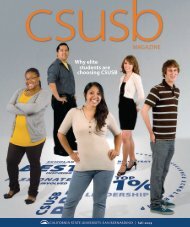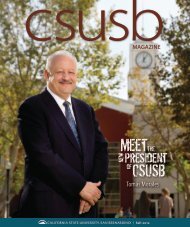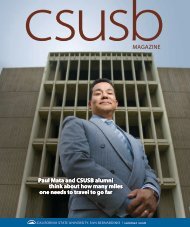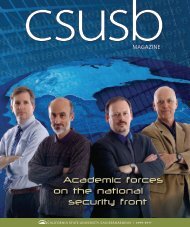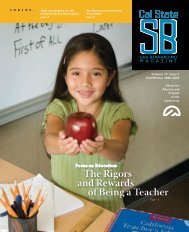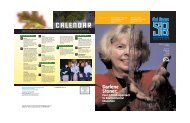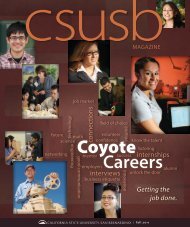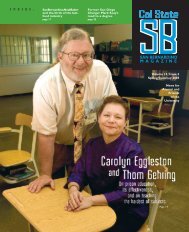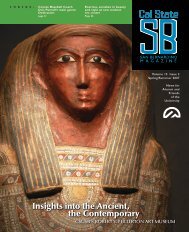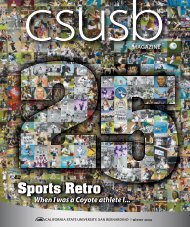The Road is Never Straight - CSUSB Magazine - California State ...
The Road is Never Straight - CSUSB Magazine - California State ...
The Road is Never Straight - CSUSB Magazine - California State ...
You also want an ePaper? Increase the reach of your titles
YUMPU automatically turns print PDFs into web optimized ePapers that Google loves.
<strong>The</strong> Can-do Competitor<br />
P<br />
A<br />
C<br />
K<br />
INSPIRATION — Traci Statler has taken many of the very ideas she has used to train college and Olympic athletes, and now uses to motivate athletes at <strong>CSUSB</strong>.<br />
by Koren Wetmore<br />
Talk with Traci Statler and you’ll leave the conversation<br />
believing anything <strong>is</strong> possible, because, from Statler’s viewpoint,<br />
it <strong>is</strong>.<br />
Gifted with a natural exuberance, she draws upon her academic<br />
training and life experience to share with athletes and nonathletes<br />
alike the keys to reaching their potential. And she’s quick<br />
to credit those who helped her reach hers.<br />
Trained by top experts in sports psychology, the New York<br />
City native has coached collegiate and Olympic athletes and challenged<br />
perceived gender barriers within her field. As an ass<strong>is</strong>tant<br />
professor of kinesiology at Cal <strong>State</strong> San Bernardino, she<br />
instructs students in the psychology of sports performance and<br />
serves as a consultant for <strong>CSUSB</strong>’s men’s baseball, women’s softball<br />
and women’s water polo teams.<br />
“What I do really transcends sport,” she says. “<strong>The</strong> ass<strong>is</strong>tance<br />
I provide <strong>is</strong> for anybody who wants to improve h<strong>is</strong> or her performance<br />
— whatever that <strong>is</strong>.”<br />
It’s a skill Statler may not have acquired had she followed her<br />
original career path. In the early 1980s, her interest focused on<br />
reporting sports performances, not enhancing them. About<br />
three-quarters through University of North Carolina, Chapel<br />
Hill’s journal<strong>is</strong>m program, however, she d<strong>is</strong>covered little or no<br />
opportunities for women in broadcast sports. Not willing to be<br />
“a weather girl in Iowa,” Statler decided to carry a double major.<br />
She found her second pursuit through a sports psychology<br />
class she had enrolled in while a member of North Carolina’s ski<br />
Beyond Sport<br />
team. In June 1990, she graduated with bachelor degrees in psychology<br />
and journal<strong>is</strong>m. Following advice she often gives her students,<br />
Statler next d<strong>is</strong>cussed her goals with her professors. It was<br />
her sports psychology professor, Richard Coop, who encouraged<br />
Statler to attend Cal <strong>State</strong> Fullerton to work with Ken Ravizza, a<br />
leader in the sports psychology field. In Ravizza she found her<br />
first mentor, one who would sharpen not only her skills but also<br />
her resolve. When Ravizza learned Statler wanted to work with<br />
baseball teams, he expressed concern over whether an all-male<br />
team would accept guidance from a female. He allowed Statler to<br />
test the waters by assigning her to a junior college baseball team<br />
as part of her master’s program at Fullerton. Statler excelled in<br />
the position and the team requested she return the following<br />
season, th<strong>is</strong> time as a paid consultant.<br />
“Ken strongly tried to convince me away from baseball. He<br />
believed I could do the work. He just wasn’t sure I would be<br />
accepted and I appreciated h<strong>is</strong> honesty,” Statler says. “H<strong>is</strong> reservations<br />
helped me work through all the ‘what ifs.’ Now about 75<br />
percent of the people I work with are men.” Statler faced a similar<br />
challenge while pursuing her doctorate at the University of<br />
Utah, where she trained under the expert eye of Keith<br />
Henschen, her second and most influential mentor, she says.<br />
Under Henschen, Statler worked with members of the U.S.<br />
Olympic Speed Skating Team and U.S.A. Track and Field, but her<br />
greatest challenge was working with the university’s football<br />
team.<br />
“Walking in and working with an all-male team can be hard<br />
for a female, but Traci commanded their respect,” says<br />
Spring/Summer 2004<br />
T<br />
R<br />
A<br />
C<br />
K<br />
S<br />
321<br />
<strong>CSUSB</strong>



